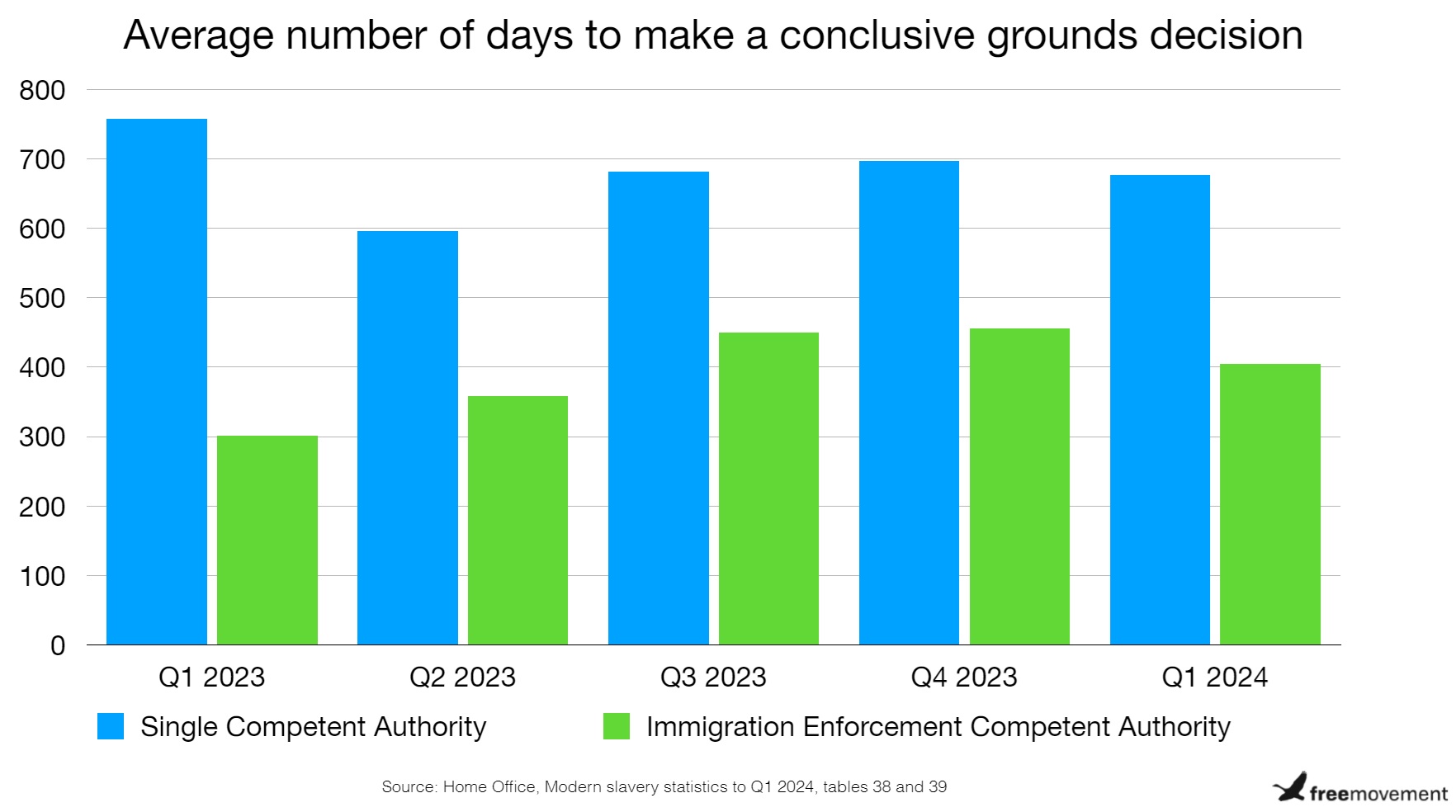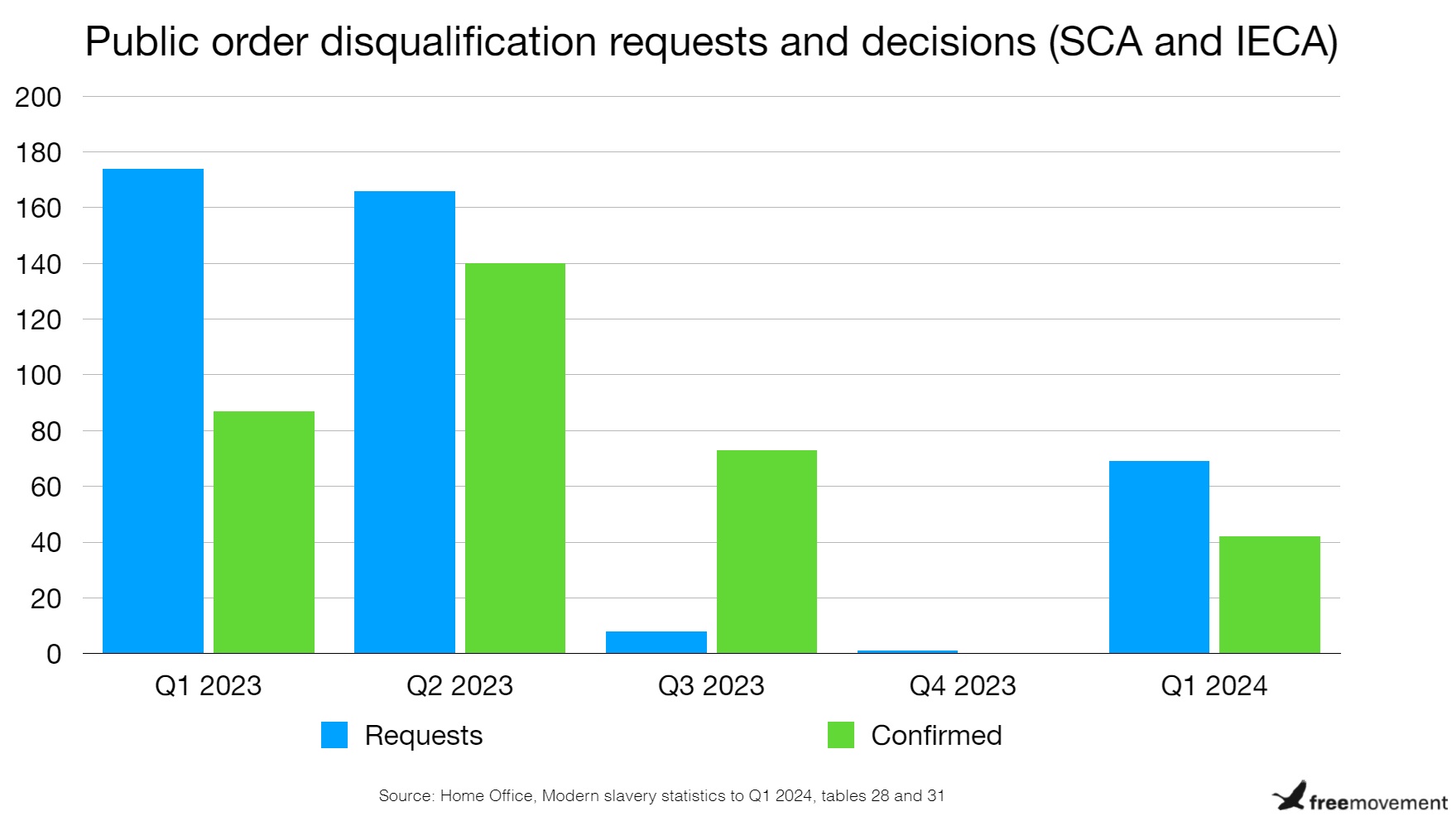- BY Sonia Lenegan

Trafficking statistics show positive decisions by the immigration enforcement competent authority are at a record low
THANKS FOR READING
Older content is locked

A great deal of time and effort goes into producing the information on Free Movement, become a member of Free Movement to get unlimited access to all articles, and much, much more
TAKE FREE MOVEMENT FURTHER
By becoming a member of Free Movement, you not only support the hard-work that goes into maintaining the website, but get access to premium features;
- Single login for personal use
- FREE downloads of Free Movement ebooks
- Access to all Free Movement blog content
- Access to all our online training materials
- Access to our busy forums
- Downloadable CPD certificates
Table of Contents
ToggleThe latest modern slavery statistics have been published and show that the ‘immigration enforcement competent authority’ had made its lowest percentage of positive conclusive grounds decisions confirming that a person is recognised as a victim of trafficking since it was set up, with a recognition rate of 20.68% for the period January to March 2024. My analysis is below and you can also read the Home Office’s write up of the statistics.
How does the modern slavery protection process work?
Firstly, a potential modern slavery survivor has to be referred by certain designated professionals into the protection system. Immigration lawyers cannot do this themselves. The protection system is called the ‘national referral mechanism’ (NRM).
Next, one of the two competent authorities must decide whether there are ‘reasonable grounds’ to think the referred person is a victim of modern slavery. The two bodies are the misnamed ‘single competent authority’ (SCA) and the ‘immigration enforcement competent authority’ (IECA). The latter was only created in 2021. As is indicated by the name, it has more of a focus on people without secure immigration status, including people who are detained or in the asylum inadmissibility process.
If the referred person receives a positive ‘reasonable grounds’ decision then they move to the next stage and will eventually receive a final decision from the competent authority handling their case on whether there are ‘conclusive grounds’ for thinking they are a victim of modern slavery.
Delays
The average time a person waited for a reasonable grounds decision from the immigration enforcement competent authority was 15 days in the period January to April 2024, the shortest it has been since 2022. Waiting times for conclusive grounds decisions have not moved much in the past 12 months but are still way too long at well over a year for the immigration enforcement competent authority, which is considerably faster than the single competent authority.

These delays were first criticised by the High Court in 2020 and the situation has worsened since then. The issue was also raised in the House of Lords this week.
Disqualification decisions
Under section 63 of the Nationality and Borders Act 2022 there are two reasons a person can be disqualified from protection. The first is where they are deemed a threat to public order and the second is where it is decided that they have claimed to be a victim of modern slavery in “bad faith”.
The period January to March 2024 shows that “bad faith” refusals have been made for the first time since introduced by the Nationality and Borders Act 2022, with nine such decisions (table 28). All nine exclusion decisions were made by the immigration enforcement competent authority (table 30).

Following an interim order made in a legal challenge, the number of public order exclusions ground almost to a halt. New guidance was published in January and decision making has clearly restarted.
Recognition rates
In November 2022 I said that I was concerned that the immigration enforcement competent authority had been set up as a “refusal factory“. Recognition rates for victims of trafficking have consistently plummeted for the authority since it was set up.
In the period January to March 2024 the single competent authority made 564 positive conclusive grounds decisions which works out as a recognition rate of 65.81%. The immigration enforcement competent authority made 405 positive decisions which was a recognition rate of 20.68%.

For reasonable grounds decisions for adults, the percentage of positive decisions made by the immigration enforcement competent authority has dropped from 96.95% for the period January to March 2022 to 32.48% for the same period this year. This had dropped as low as 6.74% last year (IECA decisions only) but a guidance change following a legal challenge saw those initial positive decisions go back up although not to pre-Nationality and Borders Act levels.
Those who decline to enter the identification system
The duty to notify process is used where an adult is suspected to be a victim of modern slavery but does not consent to entering the national referral mechanism. In the period January to March 2024 1,125 of these notifications were made (table 47), of those 734 were by the Home Office (table 49).
The top three nationalities of those who declined to enter the system were Albanian (144), Vietnamese (157) and Eritrean (104). As I have said previously, Eritreans may not be entering the system on advice that they will be granted refugee status, a far more stable form of leave than they may get if recognised as victim of trafficking.
Children, and a new report from the Anti Trafficking Monitoring Group
There has been a slight drop in the percentage of positive reasonable grounds decisions for children, when comparing January to March 2023 (81.38%) with the same period in 2024 (78.44%), although this is a slight increase from the period October to December 2023 (76.89%) (table 20). Decisions in children’s cases are made almost exclusively by the single competent authority. For conclusive grounds decisions, this has dropped from 87.96% positive decisions in January to March 2023 to 82.22% in 2024.
This week the Anti Trafficking Monitoring Group have published a report “Breaking Barriers: Supporting young victims of human trafficking transitioning into adulthood“. The report looks at the issues experienced by children who turn 18 while in the national referral mechanism process. Through a freedom of information request, it was discovered that in 2022, 70% of children turning 18 either withdrew from the process or their cases were suspended.
Several recommendations were made including:
- The Home Office must clarify the process in statutory guidance that officials in the Single Competent Authority follow when determining the suspension and withdrawal of a child’s case.
- The Home Office should publish quarterly data in relation to children in the NRM which includes: the child’s care status, and their status regarding transition to adulthood such as consent to remain, suspended and withdrawn considerations, referral to MSVCC support and access to that support.
New report from After Exploitation on data failings
After Exploitation has also published a new report this week, “‘A can of worms’: Challenges and opportunities in modern slavery evidence gathering“. The report highlights the many issues experienced in trying to get data on modern slavery from the government. Problems are reported with getting responses to freedom of information requests and parliamentary questions, as well as information hidden in large datasets
The following recommendations were made in the immigration section:
- Immigration and NRM data: The Government should publish statistics, annually or as part of existing immigration data, on the immigration outcomes of people within the NRM. This should include, in particular, NRM cases linked to controversial restricted visas such as the Overseas Domestic Worker Visa and Seasonal Worker Visa, as well as grants of asylum, Discretionary Leave, and Humanitarian Protection. We recommend the involvement of a third party, such as the Office of National Statistics, to guard against bias in framing.
- Detention and NRM data: As part of existing immigration detention data, the Home Office should include statistics on Short-Term Holding Facilities. Where data on NRM referrals in detention are included as part of ad hoc detention releases, pre and post-detention figures should be included in order to highlight cases where opportunities to identify survivors have been missed.
- Returns data: Data on the voluntary and enforced return of both potential victims and victims should continue to be maintained by the Home Office. Where survivors opt for voluntary return, the Foreign, Commonwealth and Development Office should develop a framework to measure safety upon return, and explore ways to monitor agreed outcomes, and develop forms of redress where these standards are not met.
Conclusion
Section 61 of the Nationality and Borders Act 2022, which came into force in January 2023, says that a person cannot be removed from the UK where a positive reasonable grounds trafficking decision has been made and they are in their recovery period. The recovery period ends either 30 days after the decision or on the day the conclusive grounds is made, whichever is later (section 61(3)). At the moment, as we can see with the delays in conclusive grounds decisions, that can mean a long time during which the person is not removable.
This may incentivise some faster decision making, or alternatively we could see more of the Illegal Migration Act 2023 brought into force. Not yet in force, section 28(7) and section 22 of the Illegal Migration Act 2023 would amend section 61 to exclude people from that period of protection against removal in certain circumstances, including where the duty to make arrangements for removal in section 2 applies.
SHARE

